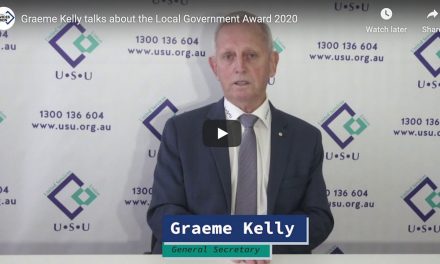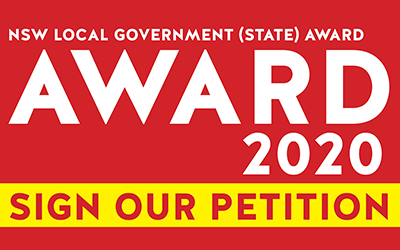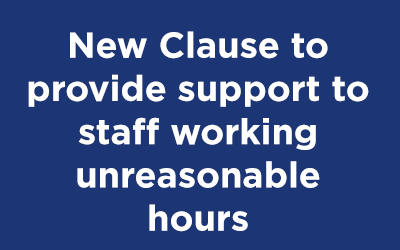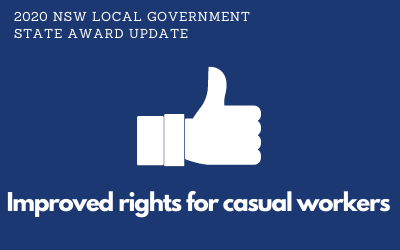IMPORTANT NOTICE TO ALL NSW LOCAL GOVERNMENT EMPLOYEES WHO ARE EMPLOYED UNDER THE STATE AWARD AND WHO BELIEVE THAT COUNCILS SHOULD CONSULT WITH THEIR STAFF.
The 2020 Local Government State Award Log of Claims from the Employers Association (LGNSW) contains many proposed changes to the Local Government (State) Award. These changes want to remove many entitlements and conditions which currently employees in the Local Government Industry enjoy. Please view the USU’s 12th August update to ensure you are upto date with the Local Government (State) Award Negotiations.
As many of you will know, the negotiations of the Local Government (State) Award has started. Local Government NSW (representing all Local Councils) have released their log of claims (their wish list for negotiations). In this wish list there are many concerning elements. Proposing to move all staff on a 38 hour week without increasing their wages (please see the USU update dated 29th August).
Another proposed change is removing any protection against being forced to work ordinary hours on Saturday and Sunday (please see update 17th September).
This update seeks to discuss the Local Government NSW proposed change to remove circumstances where Councils have to consult with their workforce about proposed changes to their workplace organisational structure.
In Local Government NSW’s wish list for negotiations, Claim 15 is listed below to be clear. It states;
Subclause 39(i)(c) [Workplace Change] – Amend the subclause to clarify that the requirement for employers to give at least twenty-eight (28) days’ notice to employees and unions before implementing workplace change only applies in relation to workplace changes concerning “termination of employment, major changes in the composition, operation or size of the employer’s workforce”.
WHY?
In clause 39 (i) (c) Local Government Award 2017 it outlines a variety of circumstances where Council has to engage in a consultation process with their staff when the Council proposes a change in the organisational structure.
At the moment the Local Government Award 2017 gives Councils the obligation to consult with staff over any proposed change in the organisational structure. If Local Government NSW gets it way, Councils who want to change your reporting lines will no longer have to consult with you. If the Council wants to move a workgroup into another department, they will not have to consult with you.
If Council wants to move staff away from a workgroup then Council would not have to inform the staff from that workgroup that their colleagues are moving. This could result in more work being placed on the shoulders of the staff who remain in that workgroup.
Local Government NSW might say they are only talking about changes which are not “major” but unfortunately the interpretation of what is “major” will change. This proposed change to the Local Government (State) Award will only in result in more disputes between staff and Councils about what is a major change.
The USU’s real concern is, why Councils want to have less consultation? Proper Consultation is a great example of a positive work relationship between the Council and their staff. If the Council wants to change your organisational structure then they should demonstrate respect and dignity for their staff by involving them into the process.
This proposal from Local Government NSW will have bad results for Councils not just for their staff. Usually the best person to discuss how to improve a workgroup’s productivity and organisational structure’s efficiency is their staff. It’s only the staff who know if a workgroup’s structure works practically and in the real world (and not just on a flowchart diagram).
Another horrible consequence of the Local Government NSW’s proposal is that if the Council wants to remove vacant positions from its organisational structure, the Council will be able to do it without even consulting with their staff and union. Again this will become a discussion on what a major change to the composition, operation and/or size is. The Council could do this by removing a few jobs at a time and then argue that the loss of the vacant jobs is only minor.
All staff in the Local Government industry know that this could be used to have dramatic effects of the Council’s staffing numbers. This could result in more work for the remaining staff. Placing even more pressure on the staff who remain.
It is a real shame that the Local Government NSW and Local Councils want to reduce the amount of consultation.
The real question is, why? What do Local Government NSW and Local Councils have to hide?




